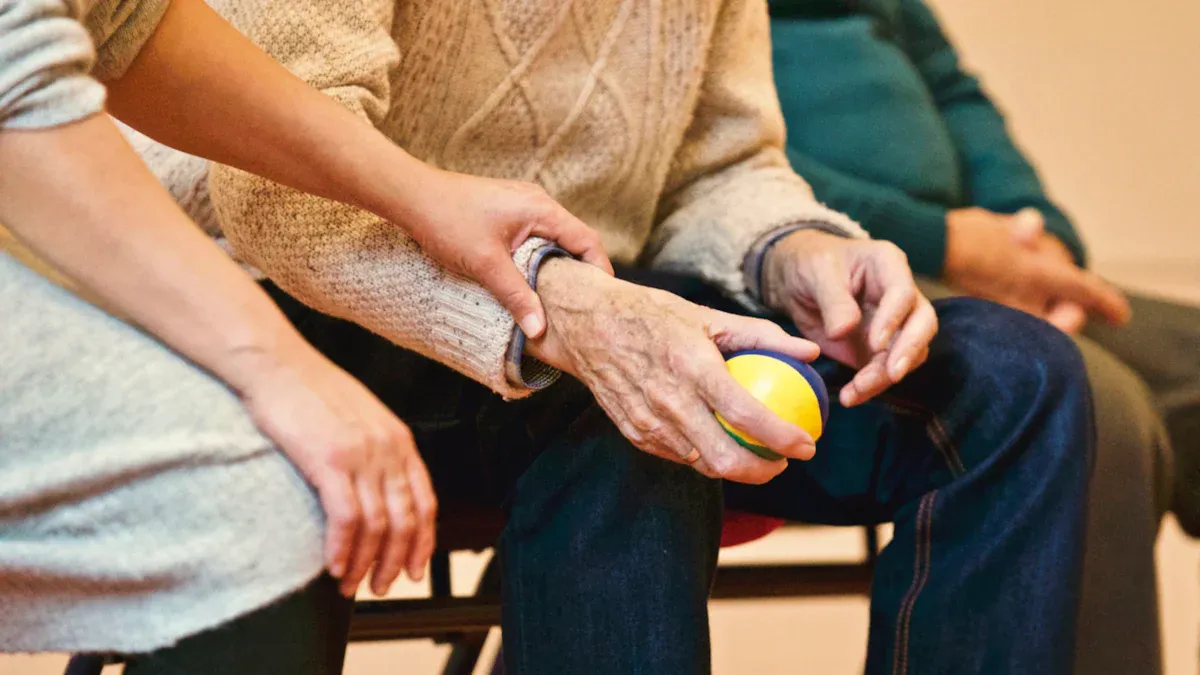Practical Self-Care Tips for Caregivers to Stay Healthy

Caring for someone else can be rewarding, but it often comes at a cost to your own health. Did you know that almost 42 million Americans provide unpaid care to adults over 50 each year? Many caregivers face challenges like stress, fatigue, and even physical health issues. In fact, 40% to 70% of family caregivers report symptoms of depression, and 23% say caregiving has negatively impacted their physical health.
To combat these challenges, it's important to implement Essential Self-Care Tips for Caregivers. Neglecting self-care can lead to burnout, making it harder for you to provide the support your loved one needs. But taking care of yourself doesn’t have to be overwhelming. Small changes, like setting boundaries or taking short breaks, can make a big difference. Remember, prioritizing your well-being isn’t selfish—it’s essential for both you and those you care for.
Key Takeaways
Notice signs of caregiver stress, like feeling tired or overwhelmed. Admitting these feelings helps you start caring for yourself.
Get help from family or friends. Sharing tasks makes things easier and lowers stress, so you can focus on yourself.
Make clear limits for your caregiving duties. Saying no to extra work saves your energy and protects your mental health.
Take care of your body with exercise, healthy food, and enough sleep. These habits give you energy and make you feel better overall.
Try mindfulness or fun activities. Things like meditation or hobbies can help you relax and feel less stressed.
Recognizing the Signs of Caregiver Stress

Caregiving can take a toll on your emotional, physical, and mental well-being. Recognizing the early signs of stress is crucial to prevent burnout and maintain your health. Let’s explore some common symptoms you might experience.
Emotional Symptoms
Feeling overwhelmed or irritable
Do you often feel like there’s too much on your plate? It’s common for caregivers to feel overwhelmed, especially when juggling multiple responsibilities. Irritability can also creep in, making you snap at loved ones or feel frustrated over small things. These feelings are your body’s way of signaling that it’s time to pause and reassess your needs.
Experiencing anxiety or depression
Many caregivers report feelings of anxiety or sadness. Studies show that 40% to 70% of caregivers experience clinically significant symptoms of depression, with 25% to 50% meeting the criteria for major depression. This is especially true for those caring for individuals with dementia.
Emotional Symptom | Percentage of Caregivers |
|---|---|
Clinically significant depression | 40% to 70% |
Major depression diagnosis | 25% to 50% |
Depression among dementia caregivers | 30% to 40% |
You might also feel emotionally drained, guilty, or helpless. These emotions are valid and common among caregivers. Acknowledging them is the first step toward finding relief.
Physical Symptoms
Fatigue and lack of energy
Feeling constantly tired? You’re not alone. Exhaustion is one of the most reported physical symptoms among caregivers. It can stem from disrupted sleep, long hours, or the emotional weight of caregiving.
Frequent headaches or body aches
Stress often manifests physically. You might notice frequent headaches, body aches, or even changes in appetite. Research shows that 11% of family caregivers report a decline in physical health due to caregiving.

Ignoring these symptoms can weaken your immune system and lead to more serious health issues. Listening to your body is essential.
Behavioral Changes
Difficulty concentrating or making decisions
Have you found it harder to focus or make decisions lately? Stress can cloud your mind, making even simple tasks feel overwhelming. This mental fog is a common sign of caregiver stress.
Withdrawing from social activities
You might notice yourself pulling away from friends or skipping social events. While it’s natural to prioritize caregiving, isolation can worsen stress and lead to feelings of loneliness. Staying connected with others is vital for your emotional health.
Tip: If you’re experiencing any of these symptoms, don’t ignore them. They’re your body’s way of telling you to take a step back and care for yourself. Recognizing these signs early can help you take action before stress becomes unmanageable.
Essential Self-Care Tips for Caregivers

Asking for Help
Delegating tasks to family or friends
You don’t have to do everything on your own. Sharing responsibilities with family or friends can lighten your load and give you some breathing room. Be specific when asking for help. For example, instead of saying, “I need help,” try, “Can you pick up groceries this week?” Clear requests make it easier for others to step in. Studies show that asking for help not only reduces stress but also improves how caregiving responsibilities are managed.
Hiring professional caregivers when possible
If your budget allows, consider hiring professional caregivers. They can provide specialized care while giving you time to focus on your own needs. Even a few hours of assistance each week can make a big difference. Remember, seeking help doesn’t mean you’re failing—it means you’re ensuring the best care for your loved one while protecting your own well-being.
Setting Boundaries
Learning to say no to additional responsibilities
It’s okay to say no. Taking on too much can lead to burnout, so it’s important to recognize your limits. Politely declining extra tasks allows you to focus on what truly matters—your health and the care you’re already providing. Saying no isn’t selfish; it’s a way to protect your energy and mental health.
Establishing clear limits on caregiving duties
Set boundaries around your caregiving role. Decide what tasks you can handle and communicate these limits to others involved. For instance, if you can’t provide 24/7 care, let your family know and explore other options together. Boundaries help prevent feelings of resentment and ensure you have time for self-care.
Maintaining Physical Health
Prioritizing regular exercise, such as walking
Physical activity is a game-changer for caregivers. Even a 20-minute walk can boost your mood and energy levels. Research shows that exercise not only improves physical health but also reduces stress and caregiver burden. Programs combining exercise with relaxation techniques have been especially effective. So, lace up your sneakers and make movement a part of your routine.
Eating a balanced diet, staying hydrated, and getting enough sleep
Your body needs fuel to keep going. A balanced diet, plenty of water, and quality sleep are essential for staying healthy. Skipping meals or surviving on caffeine might seem convenient, but it takes a toll on your energy and focus. Aim for nutrient-rich foods like fruits, vegetables, and lean proteins. And don’t underestimate the power of a good night’s sleep—it’s your body’s way of recharging.
Tip: Self-care isn’t selfish. Experts like Poole emphasize that taking care of yourself allows you to continue caregiving with joy and resilience. Small steps, like eating well or asking for help, can make a big difference in your overall well-being.
Engaging in Mindfulness and Creative Activities
Practicing meditation or relaxation techniques
Mindfulness can be a game-changer when you're feeling overwhelmed. Simple practices like meditation or deep breathing help you stay grounded and reduce stress. You don’t need a fancy setup—just a quiet space and a few minutes of your time. For example, try sitting comfortably, closing your eyes, and focusing on your breath. Inhale deeply, hold for a moment, and exhale slowly. This small act can clear your mind and help you feel more centered.
Mindfulness Practice | Benefits |
|---|---|
Meditation | Reduces stress and improves focus |
Deep breathing | Helps clear the mind and center oneself |
Even five minutes of mindfulness each day can make a noticeable difference in your mood and energy levels.
Exploring hobbies like painting, writing, or gardening
Creative activities are another fantastic way to recharge. Whether it’s painting, writing, or gardening, these hobbies allow you to express yourself and channel your emotions into something positive. For instance, painting can feel like a therapeutic escape, while gardening lets you see tangible results from your efforts.
Creative Activity | Benefits |
|---|---|
Painting | Provides therapeutic escape and self-expression |
Gardening | Channels emotions into tangible outcomes |
If you’re not sure where to start, think about what brings you joy. Maybe it’s crafting, playing music, or even trying a new recipe. These activities don’t just relieve stress—they also bring a sense of accomplishment and happiness.
Taking Breaks and Relaxing
Scheduling regular breaks to recharge
Taking breaks isn’t a luxury—it’s a necessity. Even short pauses during your day can help you recharge and maintain focus. Step outside for a quick walk, enjoy a cup of tea, or simply sit quietly for a moment. These small breaks can prevent you from feeling overwhelmed and improve your overall well-being.
Caregivers often feel guilty about stepping away, but remember, breaks are essential for sustaining your energy. Research shows that regular breaks not only boost productivity but also help you stay emotionally balanced.
Making time for enjoyable activities to reduce stress
What makes you smile? Whether it’s watching your favorite show, reading a book, or spending time with friends, make room for these activities in your schedule. Enjoyable moments act as a reset button, helping you return to your caregiving duties with renewed energy.
Regular breaks are essential for caregivers to recharge and maintain productivity.
Taking time off can lead to increased energy and focus, benefiting both you and your loved one.
By prioritizing relaxation, you’re not just caring for yourself—you’re also ensuring you can continue providing the best care possible. These small steps are part of the Essential Self-Care Tips for Caregivers that can make a big difference in your life.
Utilizing Support Systems
Caregiving can feel isolating, but you don’t have to go through it alone. Building a strong support system can make your journey easier and improve your well-being. Let’s explore some ways to connect with others and access valuable resources.
Joining Support Groups
Connecting with other caregivers for shared experiences
Talking to others who understand your challenges can be incredibly comforting. Local support groups offer a chance to meet people in similar situations. Sharing your experiences and hearing theirs can reduce feelings of isolation and provide practical advice.
Did you know? Studies show that 88% of caregivers who use support services feel they’ve become better caregivers.
Participating in online or in-person support communities
If attending in-person meetings isn’t feasible, online groups are a fantastic alternative. They’re accessible anytime, making them ideal for caregivers with tight schedules or mobility issues.
Local Support Groups | Online Support Groups |
|---|---|
Provide face-to-face interaction and familiarity with local resources. | Offer global connections and flexibility to join from home. |
Require regular attendance for maximum benefit. | Accessible 24/7, perfect for unpredictable caregiving schedules. |
Whether you choose in-person or online, these communities can help you feel less alone and more empowered.
Seeking Professional Help
Consulting a therapist or counselor for emotional support
Sometimes, you need more than peer support. A therapist or counselor can help you process emotions, manage stress, and develop coping strategies. Therapy isn’t just for crises—it’s a proactive way to maintain your mental health.
Tip: Many caregivers find that therapy helps them address feelings of guilt or anxiety, making it easier to focus on their loved ones.
Accessing respite care services for temporary relief
Respite care gives you a much-needed break. Whether it’s a few hours or a few days, this service allows you to recharge while ensuring your loved one receives quality care. In fact, nearly 6 million hours of respite care were provided to caregivers in a single year, helping them continue their roles without burning out.
Leveraging Community Resources
Utilizing local caregiving organizations or nonprofits
Local organizations can be a treasure trove of support. They often provide counseling, training, and even financial assistance. For example, the National Family Caregiver Support Program (NFCSP) has helped over 700,000 caregivers manage their responsibilities.
Access Assistance Services made 1.3 million contacts to connect caregivers with resources.
Counseling and training programs supported over 100,000 caregivers.
These services can make caregiving more manageable and improve your quality of life.
Exploring financial aid or government programs for caregivers
Caring for someone can strain your finances. Thankfully, programs like the NFCSP allocate funds to help caregivers. In FY 2021, $189 million was distributed to states to support family caregivers. Some states also offer unique initiatives, like virtual respite care or self-care workshops, to address specific needs.
Note: Don’t hesitate to reach out to aging and disability resource centers in your area. They can guide you to the right programs and services.
By tapping into these support systems, you can lighten your load and focus on what matters most—caring for your loved one while taking care of yourself.
Planning and Organizing
Staying organized can make caregiving less overwhelming and help you feel more in control. A little planning goes a long way in managing your responsibilities while carving out time for yourself.
Task Management
Creating a daily or weekly schedule
A clear schedule can be your best friend as a caregiver. Writing down tasks for the day or week helps you stay on top of everything without feeling scattered. Start by listing essential activities like doctor’s appointments, medication times, and meal prep. Then, add in personal time for self-care or relaxation.
Using a tool like the My Caregiver Journal can simplify this process. It allows you to track important details like medical history and medication lists. Plus, it encourages you to plan daily routines, making caregiving smoother and less stressful. When you know what to expect, you can approach each day with confidence.
Using tools like apps or planners to stay organized
If you prefer digital solutions, caregiving apps can be a game-changer. Apps like CareZone or Lotsa Helping Hands let you manage schedules, share updates with family, and even store medical information. Planners are another great option if you enjoy writing things down. Choose what works best for you and stick with it.
Tip: Block out time for yourself in your schedule. Treat it as non-negotiable, just like any other important task.
Setting Realistic Goals
Prioritizing essential tasks over non-urgent ones
Not everything needs to be done right away. Focus on what’s truly important and let go of less urgent tasks. For example, prioritize your loved one’s health needs and your own well-being over minor chores. This approach reduces stress and helps you feel more accomplished at the end of the day.
Celebrating small wins to stay motivated
Every step forward is worth celebrating. Did you manage to stick to your schedule today? That’s a win! Did you finally take a 10-minute break for yourself? Another win! Acknowledging these small victories keeps you motivated and reminds you that you’re doing your best.
Remember: Caregiving is a marathon, not a sprint. By staying organized and setting achievable goals, you can navigate this journey with greater ease and resilience.
Taking care of yourself isn’t just important—it’s necessary. When you prioritize your well-being, you’re not only protecting your health but also ensuring you can provide the best care possible. Self-care helps you build resilience and avoid burnout, which can lead to serious health risks like heart disease or high blood pressure.
Start small. Whether it’s taking a short walk, asking for help, or joining a support group, every step counts. Remember, seeking help shows strength, not weakness. You’re not alone in this journey, and there are resources available to support you.
Note: By caring for yourself, you’re creating a healthier, happier environment for both you and your loved one. You’ve got this!
FAQ
What if I feel guilty about taking time for myself?
It’s normal to feel guilty, but remember this: taking care of yourself helps you care for others better. Think of it like recharging a battery. You can’t pour from an empty cup, so prioritize your well-being without guilt.
Tip: Self-care isn’t selfish—it’s necessary.
How can I find time for self-care when I’m so busy?
Start small. Even five minutes of deep breathing or a quick walk can help. Use tools like planners or apps to schedule short breaks. Treat self-care like an appointment—it’s just as important as caregiving tasks.
Are there affordable resources for caregivers?
Yes! Many nonprofits and local organizations offer free or low-cost support. Check out programs like the National Family Caregiver Support Program (NFCSP) or local aging resource centers. They provide counseling, training, and even financial aid.
Resource Type | Example Programs |
|---|---|
Financial Aid | NFCSP, Medicaid Waivers |
Emotional Support | Local caregiver support groups |
How do I ask for help without feeling like a burden?
Be specific and direct. Instead of saying, “I need help,” try, “Can you handle dinner on Tuesday?” Most people want to help but don’t know how. Clear requests make it easier for them to step in.
What’s the best way to manage stress as a caregiver?
Find what works for you. Some people love meditation, while others prefer exercise or creative hobbies. Experiment with different activities to see what helps you relax. Don’t forget to connect with support groups—they’re great for sharing tips and experiences.
Reminder: Stress management is personal. What works for someone else might not work for you, and that’s okay.
See Also
Exploring Symptoms And Treatment Options For Choroid Plexus Cancer
Key Insights Into Symptoms And Treatments For Conjunctival Melanoma
Essential Information Regarding Symptoms Of Adrenocortical Carcinoma
Comprehensive Guide To Symptoms And Treatments Of Adrenocortical Adenoma
Recognizing Symptoms And Treatment Approaches For Duodenal Cancer

